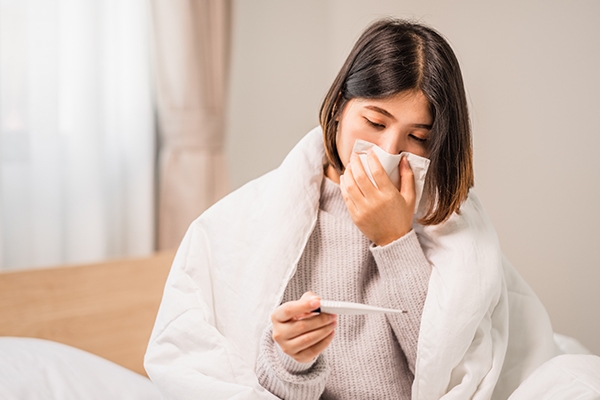Stay Healthy This Rainy Season: Protect Yourself from The Flu

Flu is prevalent but never expected. When it strikes, our work performance drops, not to mention important things that have been planned. Darn! But if we've already been hit, how do we quickly relieve it so our work performance is still on point?
About flu

The flu, or cold, is an annoying combination of fever, chills, headache, stuffy nose, and runny nose. Even though it's prevalent and you've probably experienced it many times, did you know that nothing can cure it? Yup, nothing.
Look at your cold medicine label. Instead of "treating," you will only find "relieving symptoms." Our immune system can only destroy viruses in our bodies. However, we must also complement the drugs by relieving symptoms.
Common flu symptoms include:
- fever;
- muscle or body aches;
- chills;
- headache;
- dizziness;
- sore throat;
- runny or stuffy nose;
- nausea;
- cough.
Preventing the aforesaid symptoms is the best thing we can do. It is smart to be extra cautious, especially during flu season. Then, to safeguard your beloved children and family, ensure that the influenza vaccine has been administered.
The flu can be mild or severe. Mild flu is relatively easy to recover from. Severe flu is what we find in the case of the COVID-19 pandemic.
Vaccines can minimize the risk of serious complications for those who catch the flu.
Here are some strategies for avoiding flu virus infection:
- Avoid touching your face.
- Wash your hands with soap and water regularly.
- If soap and water aren't available, use an alcohol-based hand sanitizer.
- Avoid close contact with sick persons.
- Adopt healthy habits such as getting enough rest and consuming nutritious foods.
Ways to get rid of the flu

If you already have the flu, you can go to the drugstore or receive a doctor's prescription right away. However, if your flu symptoms worsen, you can support your meds by doing the following:
- Stay hydrated. Your medications may cause you to urinate frequently. Don't use this as an excuse not to drink! Drink water, juice, clear broth, or warm lemon water with honey to keep your body hydrated. Avoid dehydrating liquids such as alcohol, coffee, and caffeinated soda.
- Rest. Your body requires rest to heal. Don't push yourself to work or engage in intense activities! It just slows recovery and may even worsen symptoms.
- Soothe a sore throat. Itching and sore throats are certainly unpleasant. To relieve it, you can gargle with salt water, ¼ to ½ teaspoon of salt dissolved in a glass of warm water. Aside from this remedy, you can also try a throat lozenge spray. When supplying saline solutions or throat lozenges to children, take caution. Keep a close eye on it.
- Treat shortness of breath. The most bothersome flu symptom is nasal congestion. It is treatable with saline nasal drops or sprays available at pharmacies. Use with caution, especially around youngsters.
- Relieve pain. The flu produces pain in various muscles throughout the body. For pain relief, you can take acetaminophen, ibuprofen, or aspirin. The pain is upsetting even to children. You can give them acetaminophen (<6 months of age) or ibuprofen (>6 months of age).
Ask the doctor for the correct dosage so you don't overdo it. Avoid using aspirin if you or your child has chickenpox or other flu-like symptoms. This is done to avoid Reye's syndrome, a rare illness that can be fatal if not treated properly. - Count on honey. Honey can help with coughs and boost the immune system. Warm honey can help prevent and alleviate flu symptoms.
- Adjust the humidity in the air. A blocked nose can be cleared with humid air. Installing a humidifier or mist humidifier in the bedroom is recommended.
The dilemma

We occasionally hear opposing viewpoints on certain types of medications. Here are some explanations that may be useful:
- Antibiotics. This sort of medication is designed to treat bacterial infections rather than viruses. If you simply use this drug to treat a virus infection, your condition will not improve. Antibiotic resistance will develop as a result of improper antibiotic use.
- Children's cold and cough meds. You most likely already have the mainstay medication. This medicine, however, may not be suitable for other people or your child. It is advisable not to just give any drug to children. Before administering any drug, consult with your doctor.
- Vitamin C. This vitamin, which is known to boost the immune system, doesn't do anything to alleviate flu symptoms. Several studies, however, have shown that taking vitamin C before a cold helps reduce the length of symptoms.
- Echinacea. A plant called echinacea has long been known to prevent and accelerate the healing of colds. However, according to a study, echinacea does not produce the same results.
Echinacea works best if taken when you have cold symptoms and lasts from 7 to 10 days. Use caution while taking it with other medications. Consult your doctor before using it. - Zinc. The evidence for the benefits of zinc is almost identical to that of echinacea. Several studies have found that consuming zinc can shorten the duration of a cold by roughly one day, especially if taken within 24-48 hours after the first symptoms. Other studies, however, have found that zinc had little effect on the flu.
Flu is more common when the temperature is chilly. Don't let your body become exposed or contaminated. Especially when your boss and coworkers rely on you. Take care of your health by obtaining enough rest, eating a balanced diet, and taking vitamins on a daily basis.
Getting an annual influenza vaccination will help you avoid the virus and stay healthy.
The influenza vaccine protects against four different types of influenza viruses:
- Influenza A (H1N1)
- Influenza A (H3N2)
- Influenza B (Victoria)
- Influenza B (Yamagata)
This vaccine is safe for pregnant women in the second trimester and beyond. GWS Medika Clinic provides influenza vaccination services for both children and adults.
If you have questions about persistent flu symptoms or want to get an influenza vaccination, visit GWS Medika Clinic, a healthcare facility in Jakarta.



